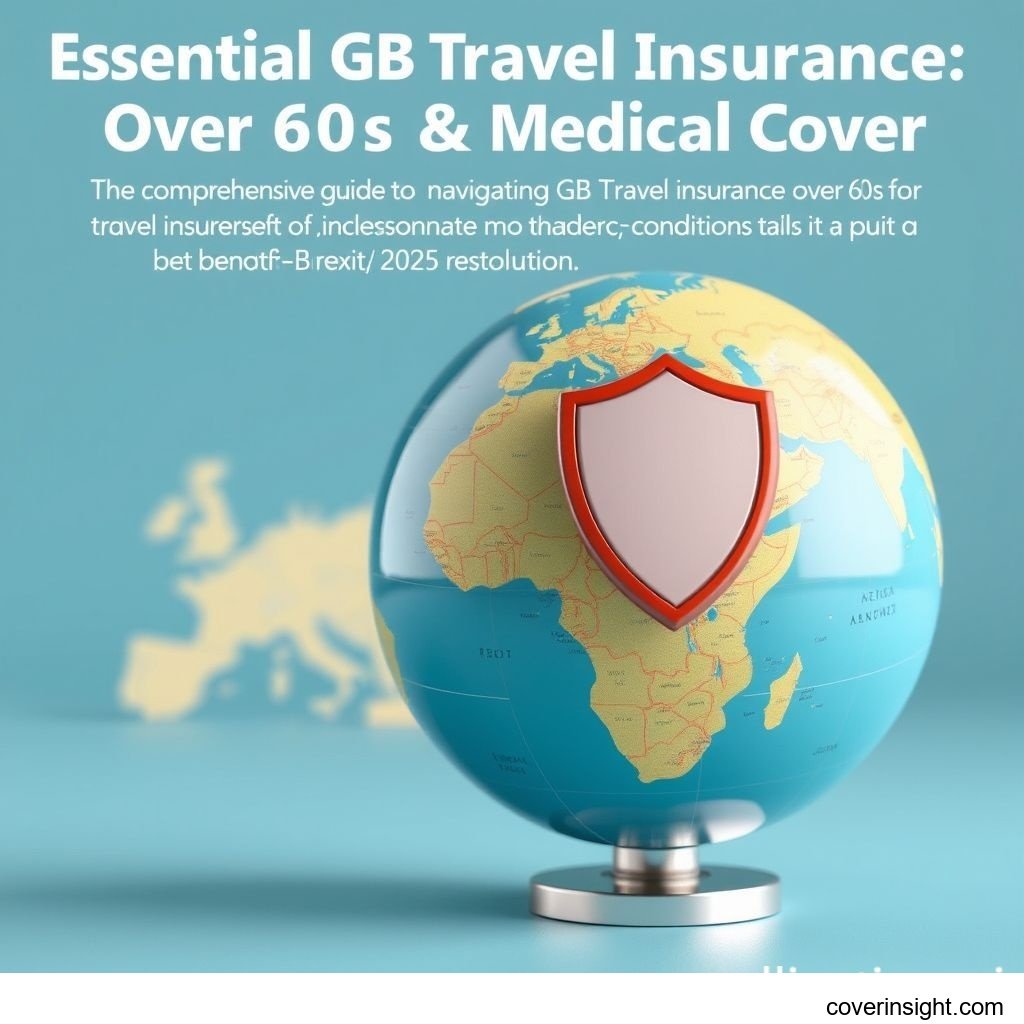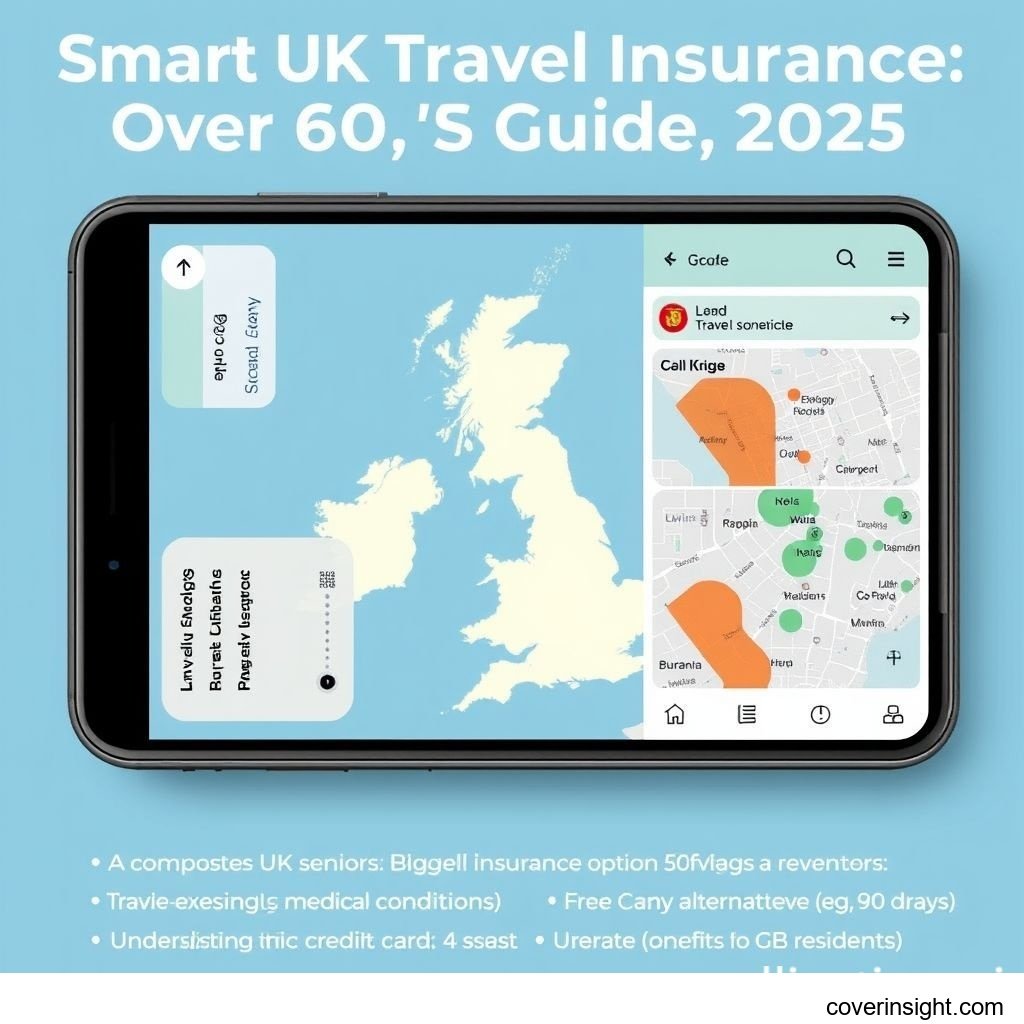GB Travel Insurance 2025: Over 60s, Medical & Long Trips
Introduction
As 2025 approaches, securing comprehensive travel insurance for over 60s in Great Britain remains a crucial step for anyone planning an overseas adventure or even a domestic long-haul trip. For many, retirement brings new opportunities to explore the world, but with age, the landscape of travel insurance can become more complex, especially when considering medical conditions or extended journeys. This guide aims to demystify the options available, highlight key considerations, and help you find the right coverage to ensure peace of mind for your travels. Understanding the nuances of policies tailored for older travellers is not just about compliance, but about protecting your health, finances, and overall enjoyment of your trip.
Understanding Travel Insurance for Over 60s
Navigating the various policies for older age groups requires a clear understanding of what’s on offer and what to look out for. Standard policies may not always cover the specific needs that come with age, making specialist travel insurance for over 60s essential.
Importance of Specialist Policies
Specialist travel insurance providers often offer more flexible and comprehensive plans that acknowledge the increased likelihood of pre-existing medical conditions and other age-related concerns. These policies are designed to provide robust protection where standard options might fall short, ensuring that you're adequately covered for unexpected events.
Key Considerations for Over 60s
When choosing your policy, several factors are particularly pertinent to older travellers:
-
Age Limits: Some policies have upper age limits, so always check if you qualify.
-
Medical Screening: Transparent and thorough declaration of medical conditions is paramount.
-
Activity Coverage: If you plan on adventurous activities, ensure they are included.
-
Trip Duration: Long trips often require different policy types (e.g., long-stay or annual multi-trip).
-
Cancellation Cover: Essential for protecting against unforeseen events before you travel.
Comprehensive Coverage Details
A robust travel insurance for over 60s policy goes beyond basic cover, providing extensive protection for various scenarios. It's vital to understand what your policy typically includes and, just as importantly, what it generally excludes.
What’s Included
A good travel insurance policy for senior travellers typically offers a range of protections. These are often tailored to address common concerns for this demographic.
Key inclusions usually feature:
-
Emergency Medical Expenses: Coverage for hospital stays, doctor's fees, and emergency treatment abroad. This is often the most significant component for over 60s.
-
Repatriation: Costs associated with returning you to your home country for medical reasons.
-
Cancellation, Curtailment, and Interruption: Reimbursement for non-refundable costs if your trip is cancelled, cut short, or interrupted due to covered reasons (e.g., illness, bereavement).
-
Baggage and Personal Belongings: Compensation for lost, stolen, or damaged luggage.
-
Personal Liability: Cover if you accidentally injure someone or damage their property.
-
Travel Delay and Missed Departure: Compensation for unforeseen delays or missed connections.
Addressing EHIC Replacement Coverage
With the UK's departure from the European Union, the European Health Insurance Card (EHIC) is largely no longer valid for UK residents. Its successor, the Global Health Insurance Card (GHIC), offers similar access to state-provided healthcare in EU countries on the same basis as a resident of that country. However, neither the EHIC nor GHIC are substitutes for comprehensive travel insurance. They do not cover private medical treatment, medical repatriation, or cancellation costs. Therefore, ensuring your travel insurance for over 60s policy explicitly addresses and covers these gaps is crucial, providing robust EHIC replacement coverage for your health abroad. Relying solely on GHIC could leave you significantly exposed to costs.
Common Exclusions
Understanding exclusions is just as important as knowing what’s covered. Common exclusions may include:
-
Undeclared Medical Conditions: Any pre-existing condition not disclosed during the application process.
-
Alcohol or Drug-Related Incidents: Injuries or claims arising from excessive alcohol consumption or drug use.
-
Hazardous Activities: Sports or activities deemed high-risk unless specifically added and paid for.
-
Travel to Restricted Areas: Countries or regions advised against by the Foreign, Commonwealth & Development Office (FCDO).
-
Negligence: Losses due to your own carelessness, such as leaving belongings unattended.
-
Self-inflicted Injuries: Intentional harm or suicide attempts.
Navigating Medical Conditions & Long Trips
Medical conditions and the duration of your trip significantly impact your travel insurance options and costs. Travel insurance for over 60s must effectively manage these factors to provide real security.
Declaring Pre-existing Conditions
One of the most critical aspects of securing travel insurance for over 60s is the honest and accurate declaration of all pre-existing medical conditions. This includes conditions you've had in the past, those currently being managed, or any for which you're awaiting diagnosis or treatment. Failure to declare can invalidate your policy, leaving you personally liable for potentially enormous medical bills overseas.
Insurers will typically ask for details such as:
-
The condition itself (e.g., diabetes, heart condition, high blood pressure).
-
Date of diagnosis.
-
Any hospitalisations or surgeries related to the condition.
-
Medications currently being taken.
Specialist providers of travel insurance for over 60s are often better equipped to offer competitive terms for a wide range of conditions, sometimes even without requiring a doctor’s note.
Understanding Medical Evacuation Limits
While emergency medical expenses cover your treatment abroad, medical evacuation limits refer to the maximum amount an insurer will pay to transport you to a suitable medical facility, or back to the UK, if necessary. For those travelling with pre-existing conditions or to remote areas, high medical evacuation limits are essential. The cost of an air ambulance can run into tens or even hundreds of thousands of pounds, making this a critical area of coverage. Always check the exact figure your policy provides for this, ensuring it aligns with the potential costs of your travel destination. Insufficient limits could lead to significant out-of-pocket expenses during a medical emergency.
Long-Stay Policies for Over 60s
Planning an extended holiday, a working sabbatical, or visiting family abroad for several months requires a specific type of coverage. Standard single-trip policies usually have a maximum duration (e.g., 30, 60, or 90 days), while annual multi-trip policies often limit individual trips to a similar timeframe. For longer journeys, specific long-stay or backpacker policies are available, though they may have different age restrictions. For travel insurance for over 60s embarking on long trips, look for policies that offer:
-
Extended continuous coverage, often up to 18 months or even longer.
-
Option to return home briefly without invalidating the policy.
-
Comprehensive medical cover for the entire duration.
Cost Analysis & Savings for Over 60s
The cost of travel insurance for over 60s can vary significantly, influenced by numerous factors. Understanding these elements can help you make informed decisions and potentially save money.
Key Price Factors
Several elements contribute to the premium you pay:
-
Age: Generally, the older you are, the higher the premium, as the risk of medical issues increases.
-
Medical History: Pre-existing conditions are a major factor, with more serious or numerous conditions leading to higher costs.
-
Destination: Travel to countries with high medical costs (e.g., USA, Canada, Caribbean) will be more expensive.
-
Trip Duration: Longer trips typically mean higher premiums.
-
Type of Policy: Single trip, annual multi-trip, or long-stay policies each have different pricing structures.
-
Level of Coverage: Higher limits for medical expenses, cancellation, or baggage will increase the cost.
-
Planned Activities: Engaging in adventure sports or activities not covered by standard policies will incur extra fees.
Tips for Saving on Premiums
While travel insurance for over 60s is an investment, there are ways to manage costs without compromising essential coverage.
Consider these saving tips:
-
Shop Around: Use comparison websites and get quotes directly from several specialist insurers. Different providers have different risk appetites and pricing models for older travellers.
-
Annual Multi-Trip Policies: If you plan multiple trips within a year, an annual policy can often be more cost-effective than buying several single-trip policies.
-
Increase Voluntary Excess: Opting for a higher excess (the amount you pay towards a claim) can reduce your premium, but ensure it's an amount you can comfortably afford.
-
Declare Accurately: While it might seem counter-intuitive, under-declaring medical conditions can invalidate your policy. Being honest upfront, even if it means a slightly higher premium, is crucial for valid cover.
-
Consider a Group or Family Policy: If travelling with a partner or family members, a joint policy can sometimes be cheaper than individual ones.
-
Review Coverage Needs: Don't pay for cover you don't need. For instance, if you're not taking expensive gadgets, you might opt for lower baggage cover.
For further guidance on choosing a reliable provider, you can consult the Financial Conduct Authority and the Association of British Insurers websites.
Choosing the Right Travel Insurance for Over 60s
Selecting the appropriate travel insurance for over 60s can feel overwhelming, but a systematic approach will help you secure the best policy for your needs. This is an essential step to protect your travels and well-being.
Comparing Policies
When comparing different options for travel insurance for over 60s, look beyond just the price. A cheaper policy might have significant exclusions or lower limits that could prove costly in an emergency.
Consider the following points for comparison:
-
Medical Expense Limit: Is it sufficient for your destination? £1 million is often a minimum, but £5-10 million is better for worldwide travel.
-
Repatriation Cover: Ensure it's included and has a generous limit.
-
Cancellation Limit: Does it cover the full cost of your trip?
-
Excess Amount: Can you afford this should you need to make a claim?
-
Policy Wording: Read the small print carefully, especially regarding pre-existing conditions and specific activities.
-
Customer Service & Reviews: A good claims process is vital. Check independent reviews.
Making a Claim
Should you need to make a claim on your travel insurance for over 60s policy, prompt action and clear documentation are key.
-
Contact Insurer Immediately: For medical emergencies, call your insurer's 24-hour emergency assistance line as soon as possible. They can guide you to appropriate medical facilities and authorise treatment.
-
Gather Documentation: Keep all relevant receipts, medical reports, police reports (for theft), and booking confirmations.
-
Be Detailed: Provide as much information as possible when submitting your claim form.
-
Follow Instructions: Adhere to the insurer's claims process to avoid delays or rejection.
Remember that thorough preparation and understanding your policy can make a significant difference should you need to claim. For more detailed information on general insurance resources, please visit our [Insurance Resources Global](/Insurance Resources Global) page. You can also find GB-specific insurance information on our GB Insurance Home page.
Frequently Asked Questions (FAQs) on Travel Insurance for Over 60s
Here are some common questions asked by travellers seeking travel insurance for over 60s, along with detailed answers to guide your decision-making.
-
How much does travel insurance for over 60s cost?
The cost varies greatly based on age, medical history, destination, trip duration, and chosen level of cover. A short trip to Europe for a healthy 65-year-old might cost under £50, while a long-stay trip worldwide for someone with multiple pre-existing conditions in their 80s could be several hundred or even thousands of pounds. Always get a personalised quote.
-
What affects travel insurance premiums for over 60s?
Premiums are primarily affected by: your age, any declared pre-existing medical conditions (and their severity), the destination of your trip (e.g., USA is more expensive due to high healthcare costs), the length of your trip, the level of cover you choose (e.g., higher medical limits increase costs), and any additional activities or cover options you select (e.g., cruise cover, winter sports).
-
Is travel insurance for over 60s mandatory?
While it's not legally mandatory to have travel insurance for over 60s to leave Great Britain, it is highly recommended. Many countries, particularly outside the EU, may require proof of insurance for visa applications. More importantly, without it, you would be personally liable for potentially enormous medical bills, repatriation costs, or lost luggage expenses, which could devastate your finances. For countries that have universal healthcare, your GHIC or EHIC provides limited public healthcare access, but this is never a substitute for comprehensive insurance.
-
How do I choose the best travel insurance for over 60s?
To choose the best policy:
-
Assess Your Needs: Consider your health, destination, trip length, and planned activities.
-
Declare Medical Conditions: Be 100% honest and accurate during the medical screening.
-
Compare Quotes: Use comparison sites and get direct quotes from specialist providers for travel insurance for over 60s.
-
Read the Small Print: Pay close attention to exclusions, limits, and policy wording, particularly for medical cover and cancellation.
-
Check Reviews: Look for insurers with good reputations for customer service and claims handling.
-
-
What are the consequences of not having travel insurance coverage?
The consequences of travelling without adequate travel insurance for over 60s can be severe. Without it, you face:
-
Hefty Medical Bills: Overseas medical treatment can cost tens of thousands, even hundreds of thousands of pounds.
-
Repatriation Costs: Being medically flown back to the UK could cost over £50,000.
-
Financial Loss: No reimbursement for cancelled trips, missed flights, or lost/stolen luggage.
-
Lack of Assistance: No 24/7 emergency helpline for advice or coordination during a crisis.
-
Legal Fees: No personal liability cover if you accidentally cause injury or damage.
-
In conclusion, investing in appropriate travel insurance for over 60s is not an option but a necessity for peace of mind and financial security. Plan ahead, compare diligently, and ensure your policy truly meets your unique needs for travel in 2025 and beyond.









Comments